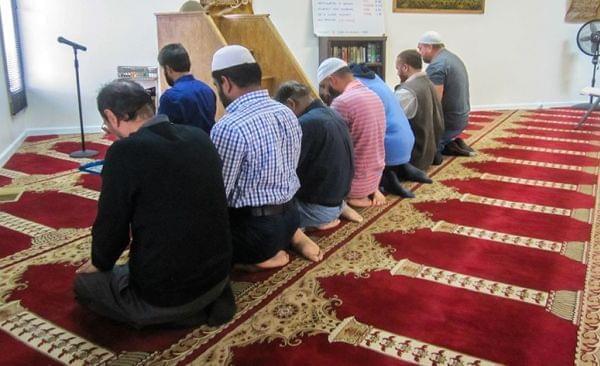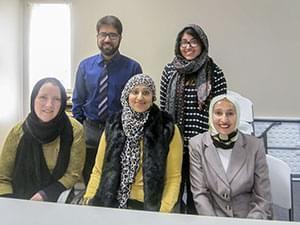Decatur Muslims Feel Accepted By Their Neighbors, But Voice Concerns Over Political Rhetoric

Men at prayer at the Greater Decatur Islamic Center, Decatur's only mosque.. Jim Meadows/Illinois Public Media
For many, the political discussion involving Muslims and terrorist attacks is confined to remarks on TV, talk radio and the Internet. For members of Decatur’s Muslim community, such talk also came in a series of harassing phone calls to the city’s only mosque.
Mosque board member Pati Ramsey heard some of the calls, which came in the wake of the terrorist attacks in Paris and San Bernardino.
“First he was just rather belligerent and using foul language,” said Ramsey, a lifelong Decatur resident who converted to Islam a few years ago. “And then, he finally left a message threatening the people here, saying that, ‘you better keep your women and children away’ and ‘I've warned you’. I reported that, called the police, and we made a police report and then he was arrested."
“I would say that some of the message that he had left was, you know, ‘Do you believe in Sharia?’" remembers Farah Mahmood, another Decatur Muslim. “It seems like it was a lot of talking points that you hear on talk radio these days.”

Members of the Decatur Muslim community featured in this story: (standing L-R) Dr. Rana Mahmood & his daughter, Inas Mahmood; (seated L-R) Pati Ramsey, Mrs. Farah Mahmood, & Wissam Hasnain.
Farah Mahmood and Pati Ramsey were among a gathering of five area Muslims who spoke with me on December 16th at Decatur’s mosque, an ordinary-looking building on the city’s north side. The building used to be a Lutheran School, and there’s no dome or minaret or other features traditionally associated with a mosque. But Muslims come there to pray, five times a day.
One of those prayer gatherings took place on the afternoon I visited. Farah’s husband, neurologist Dr. Rana Mahmood, led prayers for about eight men, plus a smaller group of women in a separate room. The worshippers faced toward Mecca, which requires them to face a corner of the room, since the building was not built with Muslim worship in mind.
The phone calls to the mosque are one example of hostility to Muslims that worries the Mahmoods’ daughter, 21 year old Inas Mahmood, a student at the University of Illinois Urbana campus. Like the other women I met at the mosque, Inas wore a headsarf as part of the Muslim tradition of hijab.
“I have a lot of friends who wear the hijab,” said Ms. Mahmood, “and I think that these remarks, they affect Muslim women more. Because they are they are visibly Muslim. And I think that these remarks, they actually target them because when people see them, they recognize them as Muslim first off. And I think that a lot of my friends are scared now, walking to classes, especially late at night and that worries me. And it also worries me for my children because this political climate right now, it's so anti-Muslim, it's so anti-minorities that it's worrisome to me in that sense.
But wearing the hijab hasn’t been a problem for Wissim Hasnain, the daughter of immigrants from Egypt, who moved to Decatur from the Chicago suburbs.
“When we moved down here, I was a little concerned because of Decatur being a small town and moving from, you know, a bigger city,” said Hasnain. “But the community has just been very embracing, very supportive. And my mother comes down to visits and she's just loves it here. She says, ‘oh my goodness, you know everybody's really super nice and very cordial’.”
Farah Mahmood agrees that people in Decatur have been accepting of the Muslim community. But she still worries about the impact of the current political rhetoric.
“I have a son,” said Mrs. Mahmood. “He’s sixteen years old. He was born in Springfield, Illinois. And when he hears things like, well, you know, ‘I think we should ban Muslims’, he is taken back by it, because he's never experienced racism. So this is his first taste, I guess. And it's sad, because I feel he’s as American as everyone else.”
Behind the heated political remarks aimed at Muslims is the fear of attacks by groups like ISIS and al-Qaeda. And while the topic wasn’t raised during our conversation at the mosque, it’s something with which Decatur’s Muslim community has had a difficult first-hand experience.
Six years ago, a man named Michael Finton, who had converted to Islam while in prison and was worshipping at the Decatur mosque, tried to blow up the Springfield Federal Building. His plans failed, because the supposed al-Qaeda operative he worked with was actually an FBI agent. Finton pleaded guilty to the attempted bombing and is now back in prison. His failed bombing attempt came as a shock to members of the Decatur mosque, including Dr. Rana Mahmood, the man who lead prayers at the mosque during my visit.
I got back in touch with Dr. Mahmood after my visit to the mosque. He said that nothing about Finton suggested he held views that would lead to violence. And he said that other prison converts to Islam he’s met are regular, peace-loving people. Mahmood said that however Finton became radicalized, his views run counter to what is taught at the mosque, also known by the Arabic word, masjid.
“I think coming to masjid for all the people who convert from the jail or from a criminal background, the masjid offers, like a heaven to them; you know, come and shape your life, go on the straight path,” said Dr. Mahmood. “But the other extremist ideology, I don’t know if they get from the Internet or some other places, the masjid has absolutely no connection, or any control whatsoever.”
Despite fears that people in Decatur would turn against the mosque because of the Michael Finton incident, Dr. Mahmood says people have remained accepting of them. And aside from the recent harassing phone calls to the mosque, the Muslims I spoke with there all say they’ve found Decatur generally accepting of their community. And Pati Ramsey says her friends have gone out of their way to tell her that the recent political rhetoric targeting Muslims is something they don’t agree with at all.
Links
- Community Conversation - Central Illinois Mosque and Islamic Center
- Balancing Islamic Religion and Everyday Life
- Muslim Students Confront Stereotypes
- Being Muslim In Illinois
- Two C-U Area Residents on Governor’s Muslim American Panel
- Muslims in America: A Short History
- On Combating Islamophobia In Illinois
- Greater Decatur Islamic Center website
